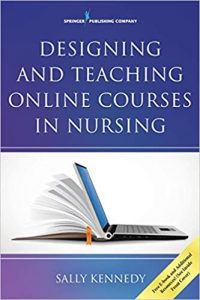
These are undoubtedly challenging and difficult times in nursing education, as well as our nation. The coronavirus pandemic is dramatically influencing not only accepted norms in our country but also in academia.
Though online teaching is nothing new and continues to grow year by year in higher education, what is different is that many nurse educators who have never taught online now have no choice.
If you are finding yourself in this challenging predicament, you are not alone.
Therefore, I would like to share some practical strategies and principles that will help you overcome any fears or anxieties you are likely having about online teaching so you can rock your content online with confidence utilizing educational best practices!
NEED to Read Resource
 I have a confession to make. I have never taught online, but I have been exposed and digested the most practical and innovative textbook on online learning in my PhD studies that are the source for today’s blog.
I have a confession to make. I have never taught online, but I have been exposed and digested the most practical and innovative textbook on online learning in my PhD studies that are the source for today’s blog.
Designing and Teaching Online Courses in Nursing by Sally Kennedy is a must-read for any nurse educator who has not taught online before.
Sally Kennedy, PhD, APRN, FNP, CNE, has been a nurse for more than 40 years and pursued her doctorate in online education with a specialization in online instructional design that has used problem-based learning to innovate and engage learners in the online environment.
Essential Principles to Strengthen Online Learning
Though Dr. Kennedy’s textbook is best suited for those developing and teaching an online course, she has identified many principles that will help any educator more effectively teach in the online environment, whether it is synchronous or asynchronous.
The strength of her textbook is that she integrates the transformational paradigm shifts that I have been advocating for years from Educating Nurses: A Call for Radical Transformation by Pat Benner and her co-authors that was first published in 2010.
Ironically the same transformational paradigm shifts such as limiting content load, contextualizing content, and emphasizing clinical reasoning are also required to engage student learners in the online environment!
Make it a priority not to simply replicate the classroom environment by regurgitating your same lectures and presenting them online and then utilizing traditional multiple-choice exams.
There is a better way.
By utilizing these best practice principles, you cannot only engage your students in online learning but take these innovative strategies and take them with you into the classroom when you return at some point in the hopefully near future!
BEFORE You Begin Teaching Online
1. Identify the BIG idea or most crucial student learning objective(s) for your course.
Instead of looking at every single objective of your class as the same, identify what is most important that must never be forgotten then develop your content to reinforce this big picture objective in all that you do.
This is a foundational principle of backward course design that is unique to online teaching yet can translate to the traditional academic setting.
2. Identify essential content to teach by asking yourself these three questions:
- What is NEED to know and non-negotiable for this course content? Emphasize this.
- What is NICE to know? Students can read this content
- What is irrelevant or NUTS to know! Do NOT go there. Let it go!
Identify teaching methods that bring context to your content that require application and knowledge usage. Case studies, clinical dilemmas, and problem-based learning that requires practical problem-solving to resolve a clinical concern are foundational online teaching strategies.
3. Students are adult learners.
One fundamental construct of adult learning theory is the importance of constructivism and that adults learn best when they create their knowledge using existing knowledge. This is why problem-based activities are so useful to strengthen student learning.
4. Determine evaluation strategies to determine if outcomes have been met.
Be willing to evaluate students differently, teaching online. The distinctive of online teaching is that the teaching strategies that deliver the content also serve as a formative and summative evaluation. Depending on how long students will not be in the classroom, for right now, traditional exams may be best.
But if this crisis continues, how about doing what every other online course does to evaluate and that is to grade discussion board posts that, in essence are the application of knowledge of clinical dilemmas or an unfolding case study?
Practical Teaching Strategies
If you struggle to engage your students with a traditional lecture on campus, they will check out even quicker online.
Therefore, burn that ship before you even begin!
Post a brief 20 minute need to know lecture online that they can review then come to the online environment prepared if it is synchronous or post meaningful active learning activities that they can complete and assimilate on their own time if asynchronous is your model.
Tried-and-true online teaching strategies that can also form as evaluation include:
1. Discussion board posts or questions.
Emphasize the application and synthesis of key course objectives and let students create and construct their best responses and reply to those of their peers.
2. Utilize current clinical dilemmas from practice.
Students must experience the content the same way they will experience it in practice. There are numerous salient clinical dilemmas from the current coronavirus pandemic that would make great dilemmas type questions for online learning and discussion.
For example, who lives and who dies when the intensive care unit is full, and a younger patient requires ventilatory support to survive. Still, there are numerous elderly patients already receiving care…
3. Unfolding case studies.
A salient case study provides the context that students must experience for the knowledge to scaffold and be easily retrieved and remembered when needed. This is why textbook content that is memorized is quickly forgotten and unable to be used at the bedside where it matters most.
Post a case study for students to work through asynchronously or if you are doing class together work through a concise case study together that emphasizes clinical realities and clinical reasoning.
FREE Unfolding Case Study
Access and download a free unfolding case study on heart failure complete with a student version that you can use immediately and a fully developed answer key by going to the homepage of KeithRN.
In Closing
When transitioning to teaching your content online, innovate, don’t stagnate! You are being forced to do things differently. This can be scary as you are being stretched in ways you did not think were possible!
You got this because you are a nurse and are inherently flexible, creative, and will rise above the current difficulties you are experiencing as an educator and seize this opportunity to implement needed change!
Dr. Kennedy has provided practical principles to show you the way. Grab the baton and do your part to integrate these transformational strategies into your online teaching that you must take with you when you return to your traditional classroom.
Transformation of nursing education is still needed and is within reach. Do your part to transform the way you teach online, and together we will get through this crisis and, as a result, better prepare students for practice and licensure!
References
- Kennedy, S. (2017). Designing and teaching online courses in nursing. New York, NY: Springer Publishing Company.
Related Blogs
Keith Rischer – PhD, RN, CEN
As a nurse with over 35 years of experience who remained in practice as an educator, I’ve witnessed the gap between how nursing is taught and how it is practiced, and I decided to do something about it! Read more…
The Ultimate Solution to Develop Clinical Judgment Skills
KeithRN’s Think Like a Nurse Membership
Access exclusive active learning resources for faculty and students, including KeithRN Case Studies, making it your go-to resource.



